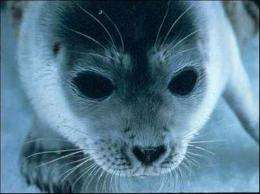Mercury levels in Arctic seals may be linked to global warming

Researchers in Canada are reporting for the first time that high mercury levels in certain Arctic seals appear to be linked to vanishing sea ice caused by global warming. Their study, a new insight into the impact of climate change on Arctic marine life, is scheduled for the May 1 issue of ACS’ Environmental Science & Technology.
Gary Stern and colleagues note in the new study that Canadian Arctic ringed seals, like many Arctic marine animals, have relatively high levels of mercury. However, researchers have never determined how these levels are linked to sea ice extent and the resulting composition of arctic cod and other prey containing mercury available to ringed seals.
The scientists analyzed the mercury content in muscle samples collected from ringed seals between 1973 and 2007. They then compared the levels to the length of the so-called “summer ice-free season,” a warm period marked by vanishing sea ice in the seals’ habitat. They found that the seals accumulated more mercury during both short (2 months) and long (5 months) ice-free seasons and postulate that this is related to the seals’ food supplies.
Higher seal mercury concentrations may follow relatively short ice-free seasons due to consumption of older, more highly contaminated Arctic cod while relatively long ice-free seasons may promote higher pelagic productivity and thus increased survival and abundance of Arctic cod with the overall result of more fish consumption and greater exposure to mercury. Longer ice-free seasons resulting from a warming Arctic may therefore result in higher mercury levels in ringed seal populations as well as their predators (polar bears and humans).
More information: Environmental Science & Technology, “Mercury Trends in Ringed Seals (Phoca hispida) from the Western Canadian Arctic since 1973: Associations with Length of Ice-Free Season”
Provided by ACS












